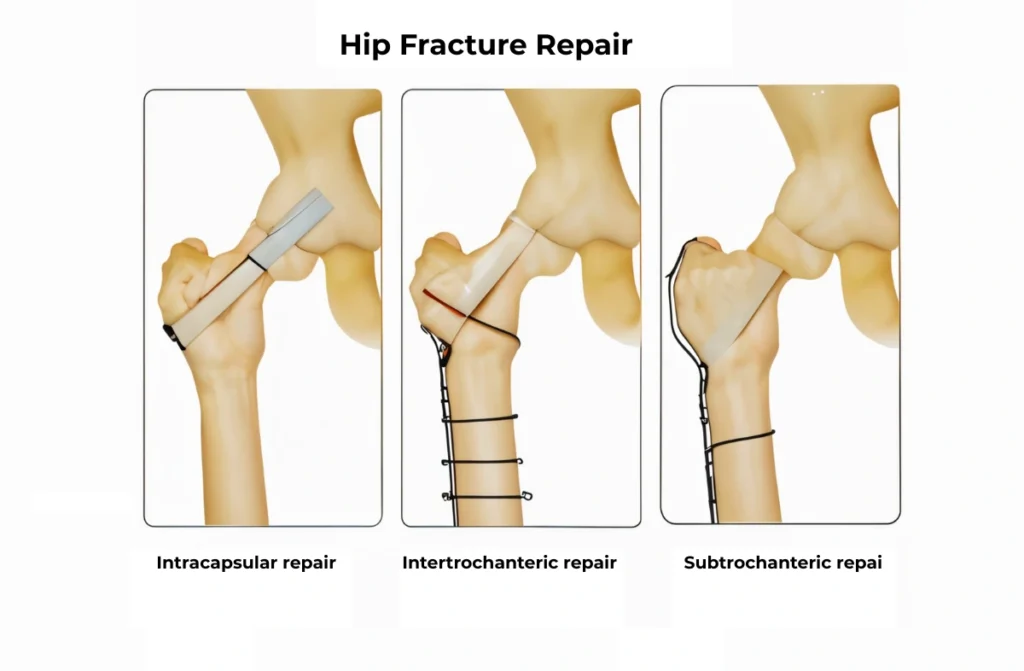Hip fractures are important injuries involving a break in the upper femur near the hip joint. These fractures, frequently caused by falls or injury, require immediate medical care to avoid complications and ensure proper healing. Early Hip Fracture Treatment in Chennai is essential for reducing pain and restoring mobility effectively.
Understanding Hip Fractures
Hip fractures are severe injuries that involve a break in the upper section of the femur (thigh bone) near the hip joint. These breaks are frequently caused by falls, particularly in elderly adults, though can also stem from trauma or accidents. Hip Fracture Treatment in Chennai can assist in lessening the serious repercussions of these injuries. Hip fractures can cause significant pain, immobility, and problems if not treated quickly. Immediate medical care is crucial to guarantee proper recovery and to avert further health complications. Usual symptoms of hip fractures involve intense pain in the hip or groin, an inability to move or bear weight on the impacted leg, and obvious deformity or bruising around the hip region.
Why Hip Fractures Require Urgent Care
Prompt treatment of hip breaks is vital to prevent complications such as blood clots, infections, and long-term disability. Early diagnosis and suitable Hip Fracture Treatment in Chennai can improveresults, allowing patients to resume their usual activities more swiftly. The kind of treatment for hip fractures depends on the location and severity of the fracture, as well as the patient’s overall health. Emergency hip fracture treatment in Chennai ensures timely care for serious cases.

Prevention of Hip Fractures
Preventing hip fractures is particularly important for older adults, who are at higher risk due to weaker bones and balance issues. Key prevention strategies include:
- Bone Health Maintenance: A diet rich in calcium and vitamin D, combined with weight-bearing exercises, helps maintain bone strength and reduce the risk of fractures.
- Fall Prevention: Implementing safety measures at home, such as using non-slip mats, installing grab bars, and ensuring adequate lighting, can significantly reduce the risk of falls.
- Regular Exercise: Engaging in activities that improve balance and strength, such as walking, yoga, or tai chi, can help prevent falls and subsequent hip fractures.
- Medication Management: Regularly reviewing medications with a healthcare provider can help identify and manage any side effects that may contribute to falls.
Minimizing Risk Factors
- Healthy Lifestyle Choices: Maintaining a healthy weight, avoiding smoking, and limiting alcohol consumption can all contribute to stronger bones and a lower risk of hip fractures.
- Regular Health Check-Ups: Regular visits to a healthcare provider can help monitor bone density and overall health, allowing for early intervention if necessary.
Types of Treatments
Treatment Options for Hip Fractures
Treatment for hip fractures often involves a combination of surgical and non-surgical approaches, depending on the severity and type of fracture. For residents seeking Hip Fracture Treatment in Chennai, several advanced options are available.
Non-Surgical Treatments:
- Immobilization: In cases where surgery is not immediately required, immobilization with braces or traction may be used to allow the bone to heal.
- Pain Management: Medications are used to manage pain and reduce inflammation during the healing process.
- Physical Therapy: Essential for regaining mobility and strength after the initial healing phase.
Surgical Treatments:
- Hip Pinning: This procedure involves the use of metal screws to hold the fractured bone in place, allowing it to heal properly. Hip fracture surgery in Chennai is commonly performed using this technique.
- Partial Hip Replacement: In some cases, the damaged part of the hip may be replaced with an artificial implant.
- Total Hip Replacement: For severe fractures, a total hip replacement may be necessary, replacing the entire hip joint with an artificial one. Those in need of comprehensive care can explore Hip Joint Fracture treatment in Kolathur for quality options.
Rehabilitation and Recovery
Rehabilitation After Hip Fracture Treatment
- Physical Therapy: A critical component of recovery, physical therapy helps restore movement, strength, and flexibility in the hip joint.
- Gradual Return to Activity: A structured rehabilitation program ensures a safe and gradual return to daily activities, minimizing the risk of re-injury.
- Pain and Swelling Management: Techniques such as icing, elevation, and prescribed medications are used to manage pain and reduce swelling during the recovery process.
Patients who undergo Hip fracture surgery in Chennai benefit greatly from personalized rehab programs.
Long-Term Recovery Tips
- Continuous Strengthening Exercises: Engaging in regular exercises tailored to strengthen the hip and surrounding muscles can prevent future injuries.
- Lifestyle Adjustments: Making necessary adjustments to daily activities to avoid putting undue stress on the hip during the recovery period.
- Follow-Up Care: Regular follow-ups with a healthcare provider are essential to monitor progress and address any issues that arise during recovery.
For patients looking for local care, Hip Joint Fracture treatment in Kolathur provides accessible rehabilitation services in the area.
Risks and Complications
Potential Complications of Hip Fractures
- Chronic Pain: Persistent pain may continue even after the fracture has healed, affecting mobility and quality of life.
- Joint Stiffness: Without proper rehabilitation, hip fractures can lead to long-term stiffness and limited range of motion.
- Development of Osteoarthritis: Hip fractures can increase the likelihood of developing osteoarthritis in the affected joint over time.
Managing Risks and Complications
- Early Intervention: Timely treatment can help reduce the risk of complications and improve overall outcomes. Emergency hip fracture treatment in Chennai is vital for high-risk cases.
- Adherence to Treatment Plan: Following the prescribed treatment and rehabilitation regimen is crucial for a successful recovery.
- Monitoring and Regular Check-Ups: Continuous monitoring by healthcare professionals ensures any complications are promptly addressed.
Conclusion
Hip fractures can deeply affect mobility and well-being, making swift and beneficial Hip FractureCarein Chennai vital. Dependent on the severity of the fracture and the patient’s general health, treatment choices extend from non-operative methods like immobilization and pain control to surgical procedures such as hip pinning or replacement. Rehabilitation is essential in recovery, centeringon restoring strength, flexibility, and mobility
Preventing later fractures includes maintaining bone health, managing risk factors, and making life style adaptations. Regular follow-ups with medical providers ensure that any complications are addressed early, promoting an easier recovery process.Comprehending and adhering to treatment plans and rehabilitation protocols can substantially improve outcomes, enabling individuals to resume their daily routines and enhance their well-being. Choosing the correct Hip Fracture Treatment in Chennai is the initial step toward a successful recovery.


